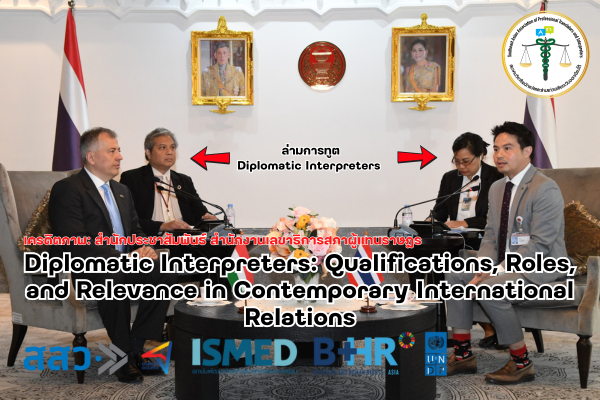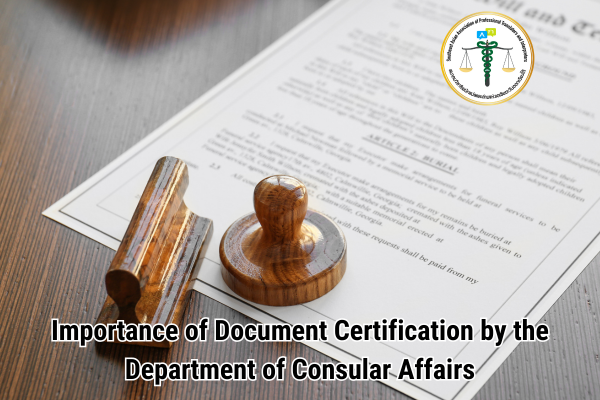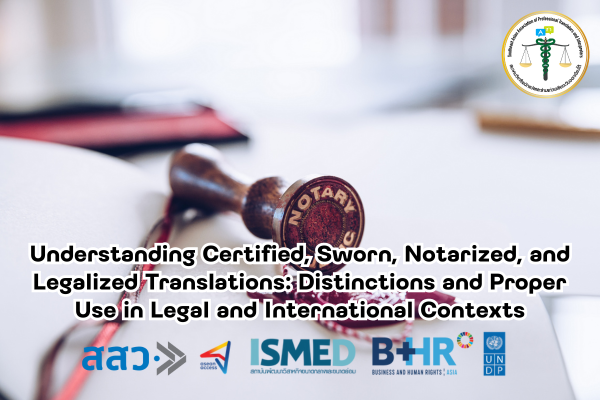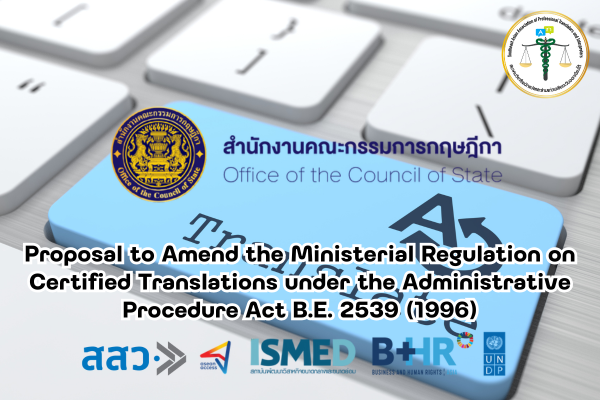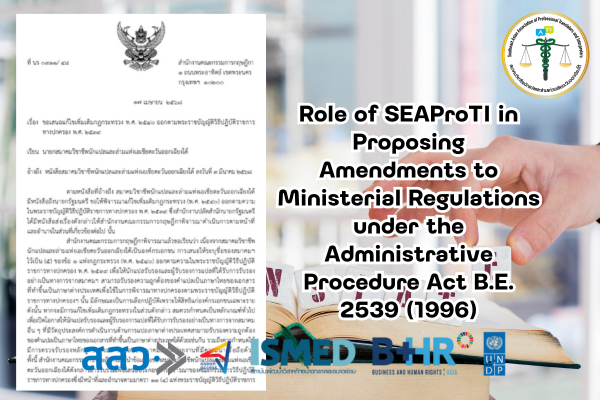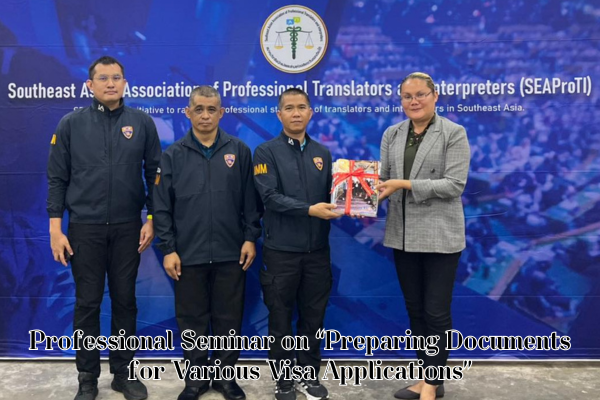Diplomatic Interpreters: Qualifications, Roles, and Relevance in Contemporary International Relations
12 April 2025
Abstract:
This article examines the qualifications, professional pathways, and roles of diplomatic interpreters in the context of increasingly complex and sensitive international relations. It underscores the importance of having in-house interpreters at embassies. It presents the Southeast Asian Association of Professional Translators and Interpreters (SEAProTI) as the most appropriate certification body in the region. The article also includes a reflection on the professional traits of interpreters in the field, enriched by insights from seasoned practitioners at global institutions.
1. Introduction In an era of globalization, mutual understanding between allied nations plays a crucial role in maintaining political stability, economic cooperation, and international security. Diplomatic interpreters are not merely language conveyors; they are essential mediators in international diplomacy, fostering trust, and ensuring that messages are conveyed with precision and cultural sensitivity. They often operate under pressure, in fluid situations, and behind the scenes of negotiations that shape the course of international relations.
2. Qualifications of a Diplomatic Interpreter Diplomatic interpreters must possess a specialized and comprehensive skillset:
-
Near-native fluency in both working languages
-
Knowledge of international relations, public international law, and diplomatic protocol
-
Cultural competence and awareness of cross-cultural nuances
-
Strict adherence to confidentiality and discretion
-
Poise, tact, and emotional control under pressure
-
Proficiency in both consecutive and simultaneous interpreting techniques
3. Professional Pathways for Diplomatic Interpreters Becoming a diplomatic interpreter requires extensive training in note-taking, memory recall, intercultural mediation, and ethical practice. Continuing Professional Development (CPD) and certification from credible institutions such as SEAProTI or AIIC are integral to maintaining professional standards.
4. Why Embassies Should Employ In-House Interpreters Having dedicated diplomatic interpreters at embassies provides significant advantages:
-
Ensures accuracy and continuity in diplomatic communication
-
Enhances information security and protects classified discussions
-
Reinforces the sending country’s professional image
-
Minimizes misinterpretation during high-stakes encounters
-
Enables interpreters to monitor one another’s output and flag discrepancies
-
Allows for workload distribution during prolonged meetings, improving interpreter endurance and overall quality
5. Case Reflection: Professional Interpreters in Bilateral Settings In high-level bilateral meetings, each interpreter interprets only when their side speaks, making the interpretation one-way. Interpreters are positioned just behind and to the side of the speaker—close enough to hear clearly but not intrusively. Their formal attire often reflects cultural distinctions; for instance, a Chinese interpreter may adopt a more austere style.
One subtle yet powerful indicator of their professionalism is the notepad—always at the ready. In this setting, consecutive interpreting is the norm, with notetaking serving as a crucial memory aid. This mode remains largely unaffected by technology and continues to rely on traditional tools: pen and paper.
A senior interpreter at the United Nations once remarked that such tête-à-tête meetings were even more intellectually stimulating than interpreting for major assemblies like the UN General Assembly. While speeches at large gatherings tend to be performative or propagandistic, real negotiations—where stakes are highest—happen in intimate, closed-door exchanges.
6. SEAProTI: The Premier Option in Southeast Asia Interpreters certified by SEAProTI offer multiple advantages:
-
Specialized training in diplomatic interpreting
-
A solid grounding in law, international affairs, and diplomatic ethics
-
Embedded within a regional and international network of professionals
-
Subject to ongoing quality assurance and CPD requirements
-
Recognized partners of governmental bodies and embassies across Southeast Asia
7. Conclusion Diplomatic interpreters are indispensable players in shaping global dialogue. Their role demands more than linguistic ability—it calls for ethical integrity, cultural diplomacy, and strategic awareness. Choosing interpreters certified by SEAProTI ensures a level of professionalism, reliability, and security that meets the highest diplomatic standards.
SEAProTI’s certified translators, translation certification providers, and certified interpreters:
The Southeast Asian Association of Professional Translators and Interpreters (SEAProTI) has officially announced the criteria and qualifications for individuals to register as “Certified Translators,” “Translation Certification Providers,” and “Certified Interpreters” under the association’s regulations. These guidelines are detailed in Sections 9 and 10 of the Royal Thai Government Gazette, issued by the Secretariat of the Cabinet under the Office of the Prime Minister of the Kingdom of Thailand, dated July 25, 2024, Volume 141, Part 66 Ng, Page 100.
To read the full publication, visit: the Royal Thai Government Gazette
ล่ามทางการทูต: คุณสมบัติ บทบาท และความสำคัญในยุคความสัมพันธ์ระหว่างประเทศยุคใหม่
เครดิตภาพประกอบปก: สำนักประชาสัมพันธ์ สำนักงานเลขาธิการสภาผู้แทนราษฎร
12 เมษายน 2568
บทคัดย่อ:
บทความนี้มุ่งศึกษาคุณสมบัติ แนวทางวิชาชีพ และบทบาทของล่ามทางการทูต (Diplomatic Interpreters) ในบริบทความสัมพันธ์ระหว่างประเทศที่มีความซับซ้อนและอ่อนไหวมากยิ่งขึ้น โดยเน้นย้ำถึงความสำคัญของการมีล่ามประจำสถานทูต พร้อมทั้งเสนอว่าล่ามที่ได้รับการรับรองจากสมาคมวิชาชีพนักแปลและล่ามแห่งเอเชียตะวันออกเฉียงใต้ (SEAProTI) คือทางเลือกที่เหมาะสมที่สุดในบริบทภูมิภาค นอกจากนี้ บทความยังนำเสนอภาพสะท้อนของล่ามมืออาชีพในภาคสนาม พร้อมการวิเคราะห์จากประสบการณ์ตรงของล่ามระดับนานาชาติ
1. บทนำ ในโลกยุคโลกาภิวัตน์ ความเข้าใจที่ถูกต้องระหว่างชาติพันธมิตรมีบทบาทสำคัญต่อเสถียรภาพทางการเมือง เศรษฐกิจ และความมั่นคงระหว่างประเทศ ล่ามทางการทูตจึงไม่ใช่เพียงผู้ถ่ายทอดภาษา แต่เป็นผู้รักษาสัมพันธภาพทางการทูต และเป็นตัวแทนความไว้วางใจระหว่างสองฝ่าย ล่ามเหล่านี้ทำงานภายใต้แรงกดดันสูง บริบทที่เปลี่ยนแปลงเร็ว และมักอยู่เบื้องหลังการเจรจาที่กำหนดทิศทางของความสัมพันธ์ระหว่างประเทศ
2. คุณสมบัติของล่ามทางการทูต ล่ามทางการทูตต้องมีคุณสมบัติที่เฉพาะเจาะจงและรอบด้าน ได้แก่:
-
ความสามารถทางภาษาในระดับใกล้เคียงเจ้าของภาษา (near-native fluency)
-
ความรู้ด้านความสัมพันธ์ระหว่างประเทศ กฎหมายระหว่างประเทศ และรัฐพิธี
-
การเข้าใจบริบทวัฒนธรรมและจารีตของประเทศคู่เจรจา
-
การรักษาความลับอย่างเคร่งครัด (confidentiality)
-
ไหวพริบ ความสุขุม และความสามารถในการควบคุมอารมณ์
-
ทักษะการล่ามพูดตาม (consecutive) และล่ามพูดพร้อม (simultaneous)
3. แนวทางการประกอบวิชาชีพล่ามทางการทูต ล่ามทางการทูตจำเป็นต้องได้รับการฝึกฝนในระดับสูง โดยผ่านหลักสูตรเฉพาะทาง และการฝึกอบรมที่เน้นการจดบันทึก การล่ามในบริบทพหุวัฒนธรรม และจรรยาบรรณในงานล่าม การพัฒนาอย่างต่อเนื่อง (Continuing Professional Development: CPD) และการได้รับการรับรองจากองค์กรวิชาชีพ เช่น SEAProTI หรือ AIIC เป็นองค์ประกอบสำคัญของวิชาชีพ
4. เหตุผลที่สถานทูตควรมีล่ามประจำของตนเอง การมีล่ามประจำสถานทูตมีข้อดีหลายประการ:
-
เพิ่มความแม่นยำและต่อเนื่องของการสื่อสาร
-
รักษาความลับและความปลอดภัยทางการทูต
-
ส่งเสริมภาพลักษณ์ของประเทศต้นสังกัด
-
ลดข้อผิดพลาดจากการแปลในโอกาสสำคัญ
-
ช่วยให้สามารถตรวจสอบการแปลซึ่งกันและกันได้ หากมีล่ามทั้งสองฝ่าย
-
การแบ่งภาระระหว่างล่ามสองคนช่วยเพิ่มประสิทธิภาพ โดยเฉพาะในงานที่ใช้เวลานาน
5. กรณีศึกษา: ภาพสะท้อนของล่ามมืออาชีพในบริบททวิภาคี ในบริบทของการประชุมแบบพบปะส่วนตัว (tête-à-tête) ล่ามแต่ละคนจะล่ามเมื่อฝ่ายของตนเองเป็นผู้พูดเท่านั้น การล่ามจึงเป็นแบบทางเดียว (one-way interpreting) ล่ามนั่งอยู่ในตำแหน่งมาตรฐานข้างหลังเล็กน้อยจากผู้พูด เพื่อได้ยินชัดเจนโดยไม่รบกวนภาพลักษณ์การเจรจา
การแต่งกายของล่ามสะท้อนความเป็นทางการ โดยอาจเห็นความแตกต่างทางวัฒนธรรม เช่น ล่ามฝ่ายจีนอาจแต่งกายแบบเคร่งขรึมกว่า จุดสังเกตสำคัญที่สะท้อนความเป็นล่ามมืออาชีพคือ “สมุดจดบันทึก” ซึ่งเป็นเครื่องมือสำคัญในการล่ามแบบต่อเนื่องที่ไม่พึ่งพาอุปกรณ์เทคโนโลยีใด ๆ
ล่ามที่มีประสบการณ์จากองค์การสหประชาชาติ ณ กรุงนิวยอร์ก เคยกล่าวไว้ว่า การล่ามในบริบทส่วนตัวเช่นนี้ น่าสนใจยิ่งกว่าการล่ามในที่ประชุมใหญ่ระดับโลก เพราะคำกล่าวปราศรัยในเวทีใหญ่ เช่น สมัชชาใหญ่ UN มักเป็นวาทกรรมที่ว่างเปล่า แต่ในการประชุมตัวต่อตัวเช่นนี้คือพื้นที่แห่งการเจรจาที่แท้จริง ซึ่งล่ามต้องจับทุกน้ำเสียง น้ำหนักคำ และเจตนารมณ์เบื้องหลัง
6. SEAProTI: ทางเลือกที่ดีที่สุดในภูมิภาค ล่ามที่ผ่านการรับรองจาก SEAProTI มีจุดเด่นหลายประการ:
-
ได้รับการฝึกอบรมด้านการล่ามทางการทูตโดยเฉพาะ
-
มีความรู้ด้านกฎหมาย ความสัมพันธ์ระหว่างประเทศ และจริยธรรมทางการทูต
-
เป็นเครือข่ายมืออาชีพในระดับภูมิภาคและระหว่างประเทศ
-
มีระบบตรวจสอบคุณภาพและการพัฒนาทางวิชาชีพอย่างต่อเนื่อง
-
เป็นพันธมิตรกับหน่วยงานรัฐบาลและสถานทูตในหลายประเทศในเอเชียตะวันออกเฉียงใต้
7. บทสรุป ล่ามทางการทูตคือผู้ปฏิบัติการเบื้องหลังที่ทรงพลังในการสร้างสะพานเชื่อมความเข้าใจระหว่างรัฐ ความสามารถทางภาษาเพียงอย่างเดียวไม่เพียงพอ แต่ต้องผนวกด้วยความเข้าใจในจริยธรรม มารยาท และวัฒนธรรมการทูตอย่างลึกซึ้ง การเลือกใช้ล่ามที่ผ่านการรับรองจาก SEAProTI เป็นทางเลือกที่รับประกันได้ถึงความน่าเชื่อถือ ความเป็นมืออาชีพ และความปลอดภัยของภารกิจทางการทูตในระดับสูงสุด
เกี่ยวกับนักแปลรับรอง ผู้รับรองการแปล และล่ามรับรองของสมาคมวิชาชีพนักแปลและล่ามแห่งเอเชียตะวันออกเฉียงใต้
สมาคมวิชาชีพนักแปลและล่ามแห่งเอเชียตะวันออกเฉียงใต้ (SEAProTI) ได้ประกาศหลักเกณฑ์และคุณสมบัติผู้ที่ขึ้นทะเบียนเป็น “นักแปลรับรอง (Certified Translators) และผู้รับรองการแปล (Translation Certification Providers) และล่ามรับรอง (Certified Interpreters)” ของสมาคม หมวดที่ 9 และหมวดที่ 10 ในราชกิจจานุเบกษา ของสำนักเลขาธิการคณะรัฐมนตรี ในสำนักนายกรัฐมนตรี แห่งราชอาณาจักรไทย ลงวันที่ 25 ก.ค. 2567 เล่มที่ 141 ตอนที่ 66 ง หน้า 100 อ่านฉบับเต็มได้ที่: นักแปลรับรอง ผู้รับรองการแปล และล่ามรับรอง


